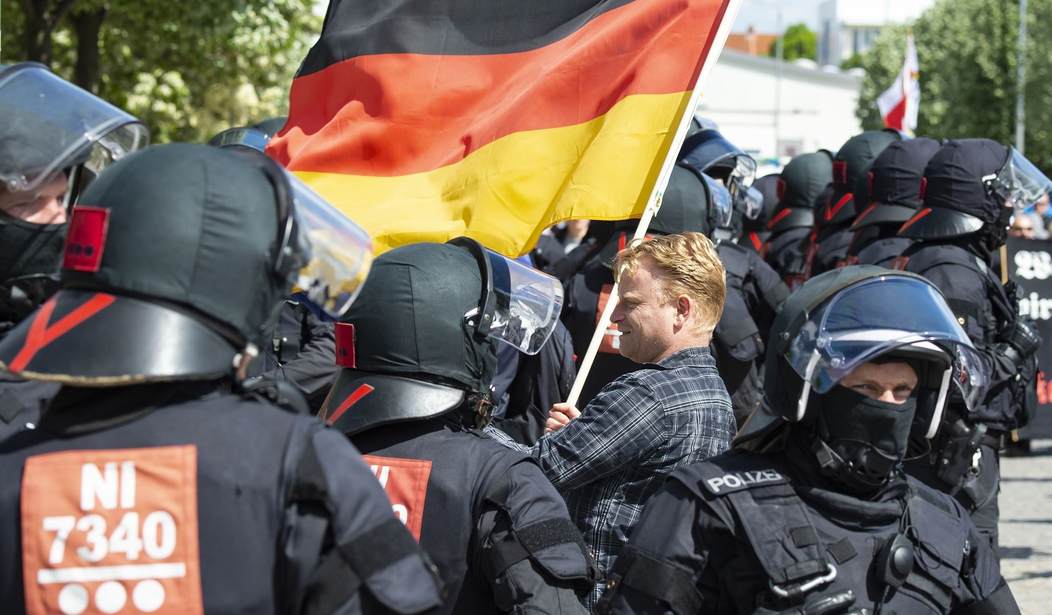Today's title question was both asked and answered yesterday by our friend Jim Geraghty at National Review. The title of his piece was, "Germany's not the reliable NATO ally Joe Biden makes it out to be." Well, that seems fairly straightforward, but what's the reasoning behind that conclusion? We work pretty closely with Germany in both military and diplomatic matters and have for a very long time. West Germany was accepted into NATO in 1955 and that was expanded following the country's reunification in 1990. There have been some bumps along the way, but the Germans have generally been team players. But Geraghty lists six reasons (or "problems") with Germany that lead him to believe that the German government isn't quite so committed to restraining Russian expansion as we might like to believe.
Back in 2022, Conan O’Brien quipped, “Well, I’ve officially lived a long life because people are excited Germany is rearming.” To hear President Biden and his administration tell it, everything’s hunky-dory and the German government continues to be a reliable NATO ally against Russian aggression in Ukraine. But if you look a little closer, there are all kinds of signals that Berlin isn’t completely committed to this course and is hedging its bets in the ongoing conflict...
Problem one: A new analysis by the Financial Times concluded that the seven largest Western banks that remain in Russia paid the Kremlin more than $3.2 billion in taxes last year, “a fourfold increase on prewar levels, despite promises to minimize their Russian exposure after the full-scale invasion of Ukraine.”
The seven banks are Raiffeisen Bank International headquartered in Austria, UniCredit and Intesa Sanpaolo in Italy, ING in the Netherlands, Commerzbank and Deutsche Bank of Germany, and OTP of Hungary.
As noted above, Jim first points out that German banks have continued to do business with Russian interests long after the invasion of Ukraine began. They also don't want to turn over billions in frozen Russian assets sitting in their banks to Ukraine. (Though they are willing to give Ukraine the interest generated by those accounts.) The Germans continue to refuse to give their long-range missiles to Ukraine even though the United States and Great Britain are now doing so. A German manufacturing company called the Knauf Group has been doing business with Russian contractors rebuilding structures in Russian-controlled eastern Ukraine.
Jim lists a couple of other supposed "problems" with Germany, but they all have one thing in common. Each of these issues is directly and specifically related to Ukraine and the ongoing war there. This brings me back to a question that I've posed here previously. Have we now reached the point where everyone (both individually and as nations) is to be judged exclusively on the strength of their support for Ukraine? Is that the new benchmark determining who is or isn't a "good ally" in 2024?
Let's keep in mind the fact that Germany still maintains strong ties with the rest of the NATO allies. And it's not as if Germany hasn't been participating in support for Ukraine. They have sent 7.1 billion euros in cash to Kyiv just this year and another 5 billion euros worth of military equipment, though not their longest-range rockets. At the same time, the German government has made multiple offers to help moderate ceasefire discussions. They have also approached China, asking them to scale back their support for Russia.
Clearly, Germany has been participating in support of Ukraine from the beginning of the war. But at the same time, they aren't slamming every door to economic opportunity shut. Is it really all that surprising that Olaf Scholz might be exercising caution? It's easy enough for the United States to pledge "unwavering support" for Ukraine and talk tough to Moscow when we're doing so from the other side of an ocean and sitting on the second-largest arsenal of nuclear weapons in the world. Germany is only a few hundred miles away from the borders of Russia's allies. Berlin is well within the reach of Moscow's nuclear arsenal, as Putin has reminded them repeatedly. And Germany builds no nukes of its own, though they do participate in allied programs to deploy American WMDs should the need arise.
As a reminder of who exactly has "clean hands" in all of this, we should ask just how "unwavering" America's support has been. Keep in mind that Russia is part of the new axis of evil, which I've written about here extensively. Yet the United States has been flushing a lot of money to and doing business with China. We've also been sending cash to Iran and ignoring their violations of sanctions on their oil industry. Granted, China isn't in a hot war with anyone at the moment, but they are definitely helping Russia's cause. Iran has been at war with our ally Israel through its proxies for years and recently launched a massive missile and drone attack directly at Israel. They have also been shipping drones to the Russians. Everything we do that props up China and Iran winds up "trickling down" to benefit Russia.
Suffice it to say that international relations are complicated. There isn't all that much in this world that can be correctly painted in black-and-white terms these days. The war in Ukraine will end sooner or later, one way or the other. And then all of the other nations will have to be able to look each other in the eye and determine how we move forward from there. That includes Germany and Russia. So perhaps we shouldn't be judging Germany too harshly at the moment.








Join the conversation as a VIP Member